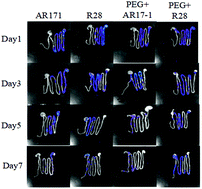Colonisation with endogenous Lactobacillus reuteri R28 and exogenous Lactobacillus plantarum AR17-1 and the effects on intestinal inflammation in mice
Abstract
The beneficial effects of probiotics on inflammatory bowel disease (IBD) are well known, although an understanding of colonisation by endogenous and exogenous bacterial strains and the effects on intestinal inflammation remains elusive. In this study, the colonisation of endogenous Lactobacillus reuteri R28 and exogenous Lactobacillus plantarum AR17-1 was investigated in healthy or PEG-treated mice using a 5(6)-carboxyfluorescein diacetate N-succinimidyl ester (cFDA-SE) labelling technique. The effects of these strains on mice with colitis induced by DSS and treated with PEG + DSS were also studied. Endogenous L. reuteri R28 and exogenous L. plantarum AR17-1 exhibited no significant differences in colonisation in healthy mice, whereas after PEG treatment, colonisation of the intestinal mucosa by L. reuteri R28 was greatly enhanced. L. reuteri R28 more effectively reduced diarrhoea caused by PEG, and L. plantarum AR17-1 more effectively reduced the colitis induced by PEG + DSS and downregulated the expression of the pro-inflammatory cytokines TNF-α, IL-1β, and IL-6. These results suggest that endogenous L. reuteri R28 may easily adapt to the intestinal environment, leading to better colonisation, whereas L. plantarum AR17-1 has a stronger inhibitory effect on inflammation. This finding is relevant to the selection of probiotics.



 Please wait while we load your content...
Please wait while we load your content...